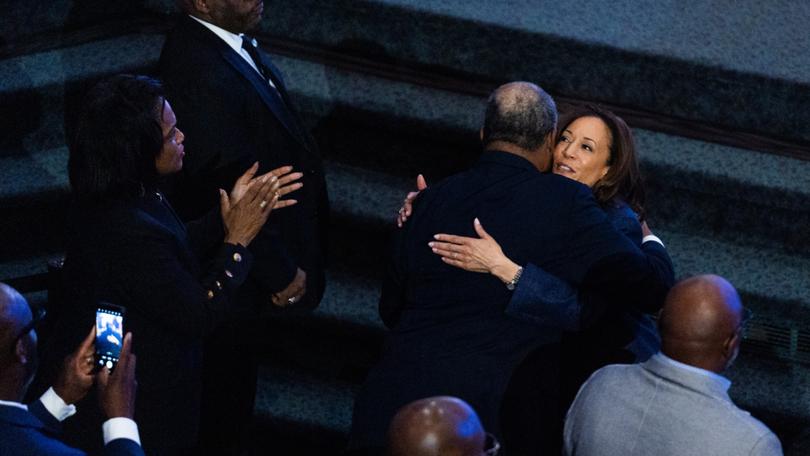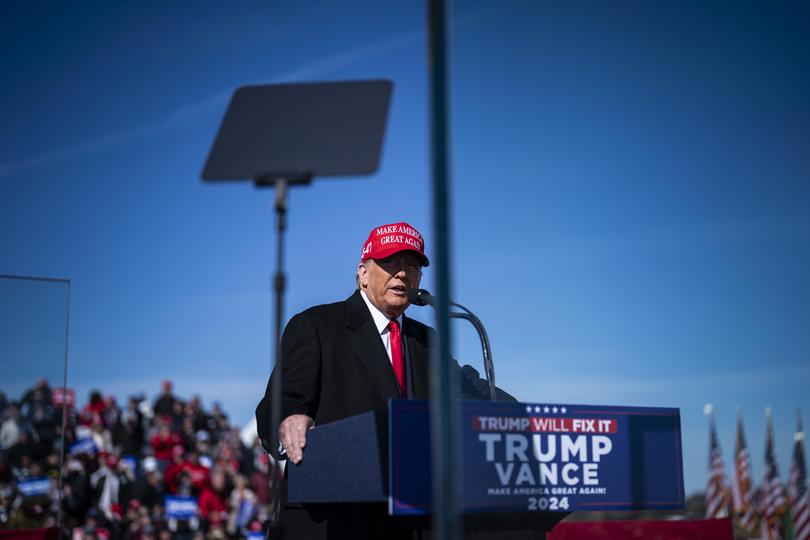US election: Closing messages show stark difference between Kamala Harris and Donald Trump
Kamala Harris used Sunday to reiterate her message that she would be a president for all Americans, while Donald Trump doubled down on portraying a dystopian future for the US that he claimed only he could fix.

Vice President Kamala Harris used her campaign stops in Michigan on Sunday to reiterate her message that she would be a president for all Americans by inviting those who disagree with her to the table, while Republican nominee Donald Trump doubled down on portraying a dystopian future for the country that he claimed only he could fix.
Harris and Trump have offered starkly different closing messages as they each fight for a tiny sliver of undecided voters in seven battleground states — Pennsylvania, Wisconsin, Michigan, Georgia, North Carolina, Arizona and Nevada — that are expected to decide who will be the next president. Polls show the two candidates remained deadlocked across all seven states, with one of the most closely contested presidential races in modern history.
The vice president has tried to appeal to a broad swath of voters by highlighting a series of economic and healthcare proposals that her advisers say are designed to appeal to Democrats and independent voters and by focusing on how she would govern compared to Trump. She has taken to saying that Trump would be focused on an “enemies list” while she would work on a “to-do list” for Americans, regardless of whether they voted for her.
Sign up to The Nightly's newsletters.
Get the first look at the digital newspaper, curated daily stories and breaking headlines delivered to your inbox.
By continuing you agree to our Terms and Privacy Policy.While visiting a church in Detroit on Sunday, Harris projected confidence that the country was ready to move past Trump.
“Let us turn the page and write the next chapter of our history,” she said.
Trump, by contrast, kicked off a Sunday campaign swing through Pennsylvania, North Carolina and Georgia by lashing out against a prestigious Iowa poll showing Harris unexpectedly in the lead there and extensively discussing unsubstantiated allegations of election cheating. He sounded hoarse and fed up, at one point saying he would put up a chart but “I don’t want to waste a lot of your time.”
Trump said he regretted leaving office after losing the 2020 election and trying to overturn the result. “I shouldn’t have left,” he said. He also imagined the press as human shields for another assassination attempt.
“To get to me, somebody would have to shoot through fake news,” he said, “and I don’t mind that much.”
Harris told reporters in Detroit that Trump was trying to discredit the election or discourage people from voting, which she said she hoped Americans would not fall for.
“They are good systems and the vote of the people will determine the outcome of this election,” she said. “And everyone must know that their vote is their power to determine the outcome of the election, and their vote will count. It does matter.”
Trump’s Sunday outbursts were the latest instances of his riffs overshadowing his campaign’s rehearsed focus on immigration and the economy. On Thursday night he set off a fresh controversy when he suggested former Rep. Liz Cheney (R-Wyoming) should face gun barrels. Trump argued he was saying she would not want to serve in combat, but the Harris campaign portrayed it as a threat to execute her, as he has implied for his critics on other occasions.
“President Trump talks about the issues in every single speech that he gives,” Trump campaign spokeswoman Karoline Leavitt said. “It is the fake news media that chooses to create hoaxes and take his words out of context.”
Trump advisers said they’re confident their closing pitch is working based on Republican leads in voter registration and early voting turnout in the swing states. The initial data suggest Republicans have made up ground in taking advantage of flexible voting options rather than voting disproportionately on Election Day — but it’s too soon to tell whether the party is growing the electorate or shifting the same voters earlier. The other open question is which way independents and unaffiliated voters are breaking.
Harris is airing her “closing message” ad on Sunday during NFL games throughout the day. The two-minute ad, titled “Brighter Future,” is aimed at presenting an optimistic and patriotic vision of the country under Harris’s leadership, campaign chair Jen O’Malley Dillon said on a campaign call with reporters on Saturday.

The Harris campaign believes Trump’s recent Madison Square Garden rally in particular - especially comedian Tony Hinchcliffe’s joke calling Puerto Rico a “floating island of garbage” - has helped push undecided voters their way in the campaign’s final stretch. They also said former Trump officials’ speaking out against Trump helped remind voters what they didn’t like about him, most notably former chief of staff John F. Kelly, whose interview saying Trump praised Hitler and met the definition of a fascist appeared in local news broadcasts across the swing states.
The Harris campaign has seized on top Republicans, including House Speaker Mike Johnson (R-Louisiana), for publicly embracing a series of unpopular policy proposals, including repealing and replacing the Affordable Care Act and repealing the Chips and Science Act, which Johnson later backtracked on. They have also pointed to comments from Elon Musk in which he said some of Trump’s economic proposals would cause temporary “hardship” for the middle class that would be “necessary” to achieve long-term goals.
A second Harris campaign official said in an interview that Hinchcliffe’s Puerto Rico comments also helped mobilize high-profile Latino artists for Harris in the last week of the campaign, including Bad Bunny and Jennifer Lopez. The Harris campaign had been in conversations with Bad Bunny — who is Puerto Rican and one of the biggest superstars in the world — and had long hoped for his endorsement because it could help sway Latino voters, according to a person familiar with the conversations. The Harris campaign happened to roll out a Puerto Rico policy the same day as Hinchcliffe’s comments and Bad Bunny endorsed the vice president shortly after. Lopez appeared with Harris at a campaign rally last week.
Some on the Trump campaign moved to distance the former president from the Puerto Rico comment - a rare move for a candidate who usually avoids apologizing, reflecting the sharp backlash and the stakes of the large Puerto Rican population in the critical battleground of Pennsylvania. Democratic comparisons between the Trump rally and a 1939 Nazi rally at the same venue prompted the former president to repeatedly dispute the connection.
“I’m not a Nazi,” he said at a rally on Monday.
At a large rally in Washington last Tuesday — on the same site where Trump spoke on Jan. 6, 2021, before his supporters sacked the Capitol — Harris tore into Trump as un-American, casting him as a “petty tyrant” and calling him “unstable,” “obsessed with revenge,” “consumed with grievance” and “out for unchecked power.” While her comments went beyond Trump — touching on her economic proposals, health care and abortion — Harris’s decision to hold the rally on the Ellipse reflected a calculation that reminding voters of Trump’s involvement with a dangerous, mutinous crowd four years ago was her strongest argument in the campaign’s closing days.
“Donald Trump has spent a decade trying to keep the American people divided and afraid of each other. That’s who he is,” Harris said during her 30-minute speech. “But America, I am here tonight to say: That’s not who we are.”
Trump’s stump speeches over the last weeks of the campaign heavily emphasized immigration, returning to the issue that originally electrified his candidacy in 2015. Trump has started calling the border more important than the economy - coinciding with cooling inflation and polls showing Harris has cut into his advantage on who voters trust more to handle economic issues.
The campaign went on the attack over Biden’s remark last week that appeared to call Trump’s supporters “garbage.” The White House said Biden was referring specifically to Hinchcliffe’s rhetoric at the Madison Square Garden rally, and Harris distanced herself by denouncing insults based on political disagreements. Biden’s comment became a rallying cry in the MAGA movement, with Trump staging a photo op driving a garbage truck and some supporters attending his rallies wearing trash bags.
“Their entire closing pitch is ‘Donald Trump is bad and the people who vote for him are bad too,’” Leavitt said. “It’s the most divisive rhetoric and closing argument from any campaign ever.”
Television viewers have been receiving an entirely different emphasis from the Trump campaign. Most of the $38.2 million spent on ads in the week ending Nov. 3 focused on tying Harris to Biden. “Kamala backed Biden on everything,” announced the top shot, drawing $9 million on broadcast and cable TV. The campaign also spent $8 million on an ad attacking her for inflation and rising healthcare costs while showing Harris laughing and falsely accusing her of giving Medicare and Social Security benefits to “illegals.” Another ad, at almost $7.3 million, features Harris in an interview declining to name anything she would do differently.
For the Harris campaign, the top ads show Trump saying in 2016 that women should be punished for abortion, accuse him of seeking “unchecked power,” and attack him for bragging about his role in overturning Roe v. Wade, the Supreme Court decision that guaranteed abortion rights for a half-century. None of those ads shows Harris on screen, other than the tagline approving the message.
© 2024 , The Washington Post
